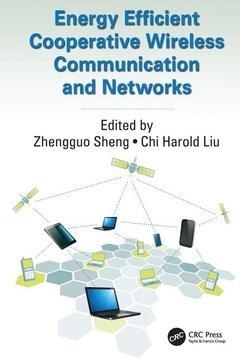Energy Efficient Cooperative Wireless Communication and Networks
Auteurs : Sheng Zhengguo, Liu Chi Harold

Compared with conventional communications, cooperative communication allows multiple users in a wireless network to coordinate their packet transmissions and share each other's resources, thus achieving high-performance gain and better service coverage and reliability. Energy Efficient Cooperative Wireless Communication and Networks provides a comprehensive look at energy efficiency and system design of cooperative wireless communication.
Introducing effective cooperative wireless communication schemes, the book supplies the understanding and methods required to improve energy efficiency, reliability, and end-to-end protocol designs for wireless communication systems. It explains the practical benefits and limitations of cooperative transmissions along with the associated designs of upper-layer protocols, including MAC, routing, and transport protocol.
The book considers power efficiency as a main objective in cooperative communication to ensure quality-of-service (QoS) requirements. It explains how to bring the performance gain at the physical layer up to the network layer and how to allocate network resources dynamically through MAC/scheduling and routing to trade off the performance benefits of given transmissions against network costs.
Because the techniques detailed in each chapter can help readers achieve energy efficiency and reliability in wireless networks, they have the potential to impact a range of industry areas, including wireless communication, wireless sensor networks, and ad hoc networks.
The book includes numerous examples, best practices, and models that capture key issues in real-world applications. Along with algorithms and tips for effective design, the book supplies the understanding you will need to achieve high-performing and energy efficient wireless networks with improved service coverage and reliability.
Introduction. Fundamental Understanding of Cooperative Communication. Reliability of Cooperative Transmission. Energy Consumption of Cooperative Transmission. Throughput of Cooperative Transmission. Delay Analysis of Cooperative Transmission. Cooperative Communication in Single-Hop Scenario. Power Efficiency of Cooperative Transmission. Optimal Power Allocation of Cooperative Transmission. Cooperative Communication in Multi-Pair Multi-Hop Scenario. REACT: Residual Energy-Aware Cooperative Transmissions. Joint Beamforming and Power Allocation. Selfishness-Aware Energy-Efficient Cooperative Networks. Network Protocol Design of M2M-Based Cooperative Relaying.
Zhengguo Sheng is a lecturer at the University of Sussex, UK, and co-founder of WRTnode. His current research interests cover Internet-of-Things, machine-to-machine (M2M), mobile cloud computing, and power line communication (PLC). Previously, he was with the University of British Columbia as a research associate, and with France Telecom Orange Labs as the senior researcher and project manager in M2M and Internet-of-Things, as well as the coordinator of Orange and Asia telco on NFC-SWP partnership. He is also the winner of the Orange Outstanding Researcher Award and CEO Retention bonus recipient, 2012. He also worked as a research intern with IBM T. J. Watson Research Center, USA, and U.S. Army Research Labs. With six years of research experience across industry and academia, Sheng has research interests that cover a wide range in wireless communication from the fundamental information theory to radio technology and protocol design, and so on. Before joining Orange Labs, he received his Ph.D. and M.S. with distinction at Imperial College London in 2011 and 2007, respectively, and his B.Sc. from the University of Electronic Science and Technology of China (UESTC) in 2006.
He has published more than 30 prestigious conference and journal papers. He serves as the technical committee member of ELSEVIER Journals of Computer Communications (COMCOM). He has also served as the co-organizer of IEEE International Symposium on Wireless Vehicular Communications (WiVeC’14), session chair of IEEE VTC’14-Fall, technical program committee members of Tensymp'15, CloudCom'14, SmartComp'14, WCSP'14, Qshine'14, ICCAAD'14, ContextDD'14, etc. He is also a member of the Institute of Electrical and Electronics Engineers (IEEE), Vehicular Technology Society (VTS) and the Association for Computing Machinery (ACM).
Chi Harold Liu is a Full Professor at the School of Software, Beijing Institute of Technology, China. He is also the Director of IBM Mainframe Exc
Date de parution : 10-2016
15.6x23.4 cm
Date de parution : 11-2014
15.6x23.4 cm
Thèmes d’Energy Efficient Cooperative Wireless Communication and... :
Mots-clés :
Cooperative Transmission; Relay Node; Cooperative Communication; Power Consumption; Cooperative Wireless Communication; Relay Selection; Cooperative Wireless Networks; Path Loss Exponent; Reliability of Cooperative Transmission; Outage Probability; Energy Consumption of Cooperative Transmission; Energy Savings; Delay Analysis of Cooperative Transmission; Average Power Ratio; Power Efficiency of Cooperative Transmission; Conventional Cooperation; Optimal Power Allocation of Cooperative Transmission; DAF; Power Allocation; Routing Algorithm; Outage Performance; Total Transmission Power; QoS Factor; Multi-hop Transmissions; Cross-Layer Design; Cooperative Routing; Reuse Factor; SC; Wireless Multimedia Networks; Proposed Routing Algorithm; Ya Xi



